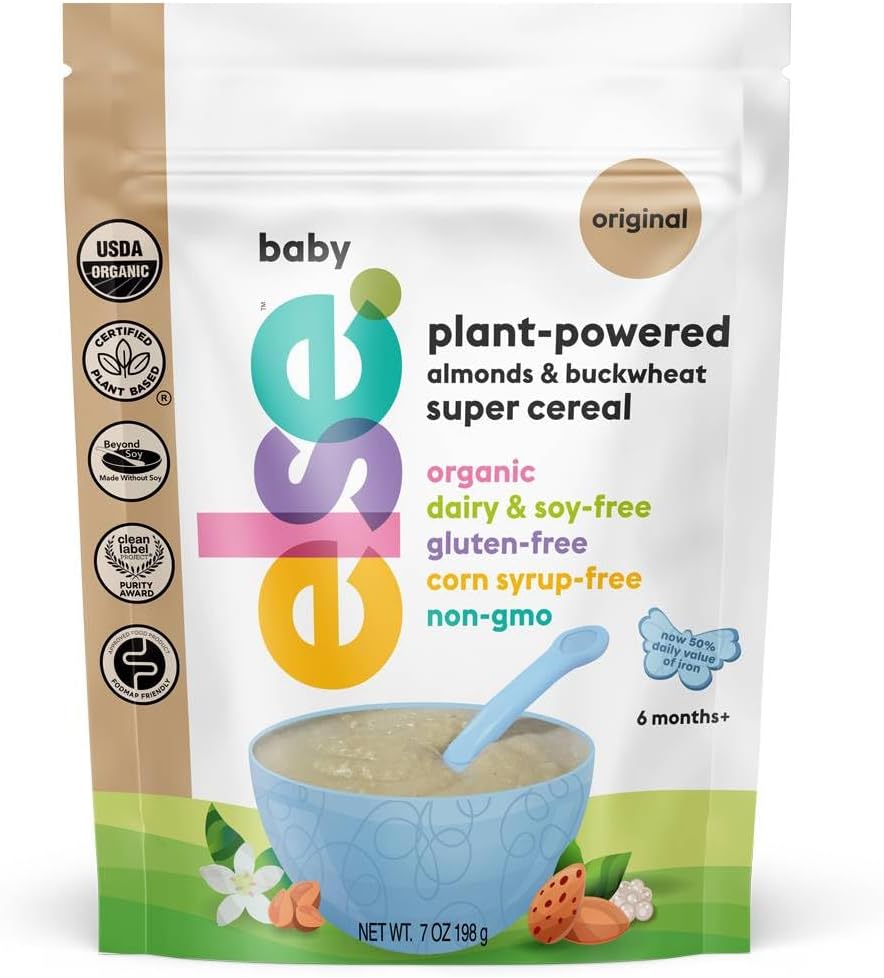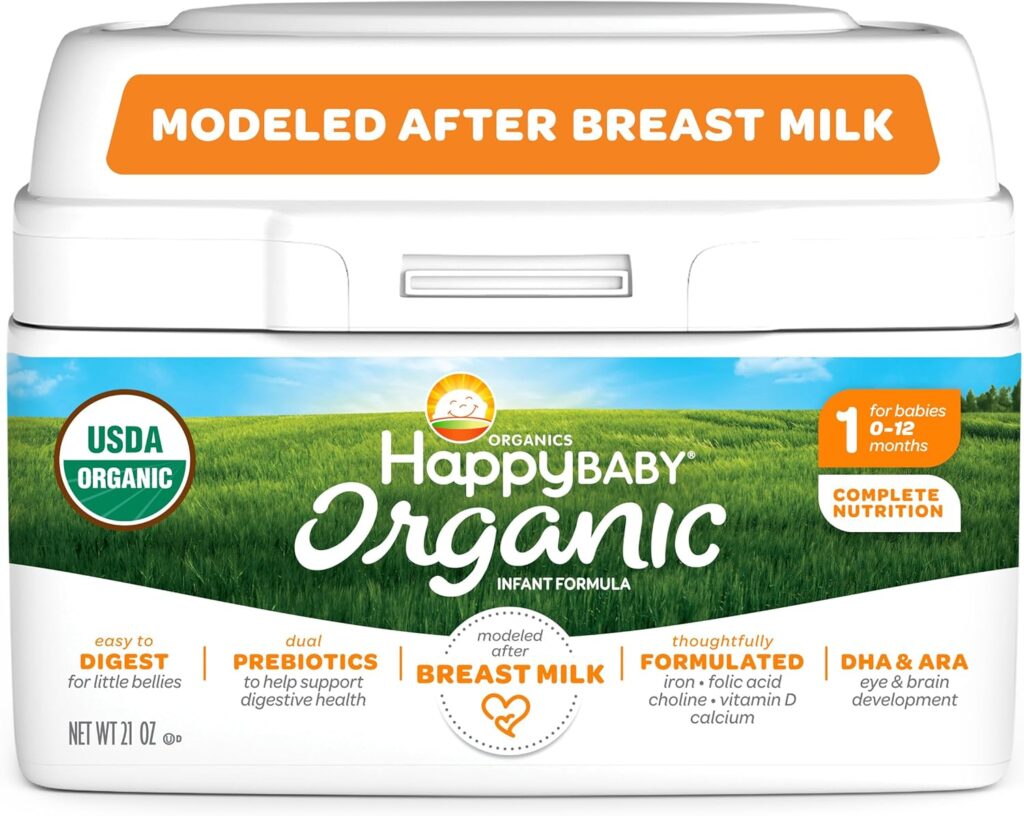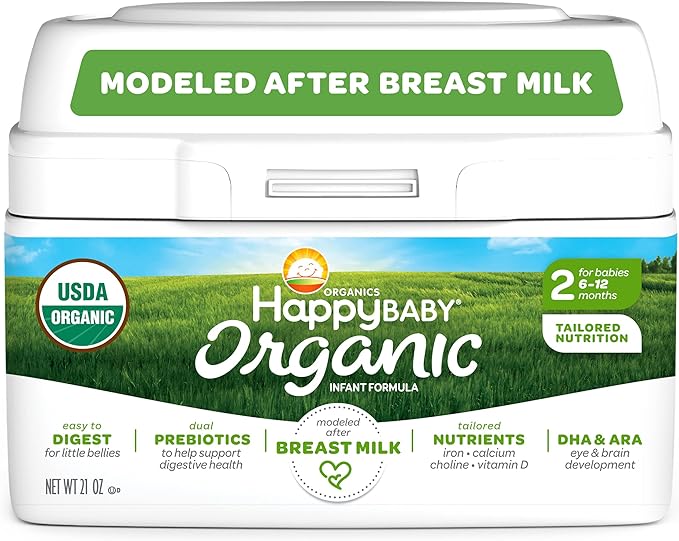The best organic baby formula provides essential nutrients without harmful chemicals or additives. It supports healthy growth and development.
Choosing the right baby formula is crucial for your infant’s health. Organic baby formulas are free from synthetic pesticides, hormones, and genetically modified organisms (GMOs). They often contain higher quality ingredients like organic milk or soy. Parents prefer them for their safety and nutritional benefits.
These formulas offer a great alternative for babies who can’t be breastfed. Always consult your pediatrician before switching formulas. Reading labels carefully can help ensure you select the best option for your baby. Organic formulas are increasingly popular, thanks to their natural, wholesome ingredients that support a baby’s early development.

Why Organic Baby Formula Matters
Choosing the right baby formula can be overwhelming. Many parents prefer organic baby formula for its natural ingredients. Organic formulas offer peace of mind. They provide essential nutrients without harmful chemicals.
The Benefits Of Going Organic
Organic baby formulas use natural ingredients. This means fewer pesticides and synthetic additives. Here are some key benefits:
- Better nutrition: Organic formulas contain high-quality proteins and fats.
- Fewer chemicals: No synthetic pesticides or fertilizers.
- Gentle on babies: Fewer additives reduce the risk of allergies.
- Sustainable: Organic farming practices are eco-friendly.
Understanding Organic Certifications
Not all organic labels are the same. Understanding these labels helps you choose the best formula.
| Certification | Meaning |
|---|---|
| USDA Organic | Products must be 95% organic. |
| EU Organic | Products must be 95% organic by EU standards. |
| Non-GMO Project Verified | Ensures no genetically modified organisms. |
Each certification has strict guidelines. Look for these labels when choosing a formula.
Key Ingredients In Organic Baby Formulas
Choosing the best organic baby formula ensures your baby gets essential nutrients. Organic formulas are free from harmful additives and made with natural ingredients.
Nutrients Essential For Baby’s Growth
Organic baby formulas include several key nutrients important for growth and development. Here is a list of essential nutrients:
- Proteins: Crucial for muscle and tissue development.
- Carbohydrates: Provide energy for daily activities.
- Fats: Essential for brain development and energy.
- Vitamins: Vital for immune health and overall growth.
- Minerals: Support bone development and metabolic functions.
Proteins in organic baby formulas often come from milk or soy. Carbohydrates usually come from lactose or organic glucose syrup. Healthy fats are derived from organic vegetable oils.
| Nutrient | Source |
|---|---|
| Proteins | Milk, Soy |
| Carbohydrates | Lactose, Organic Glucose Syrup |
| Fats | Organic Vegetable Oils |
Avoiding Harmful Additives
Organic baby formulas are free from harmful additives. This ensures your baby consumes only natural ingredients. Here are some additives to avoid:
- Artificial Preservatives: May cause allergies and health issues.
- Synthetic Hormones: Linked to developmental problems.
- GMOs: Potential long-term health risks.
- Artificial Colors: Can trigger allergic reactions.
- High Fructose Corn Syrup: Linked to obesity and diabetes.
Choosing organic baby formula helps avoid these harmful substances. Always read the ingredient list carefully. Look for certifications that ensure the product is truly organic.
Decoding Labels On Organic Baby Formula
Choosing the best organic baby formula can be overwhelming. Understanding labels helps make an informed decision. Let’s dive into how to decode these labels and ensure your baby gets the best nutrition.
Interpreting Nutrition Information
Reading the nutrition information is crucial. Pay attention to key nutrients:
- Proteins: Look for high-quality protein sources.
- Fats: Ensure it includes healthy fats like DHA and ARA.
- Carbohydrates: Check for lactose or other natural sugars.
- Vitamins and Minerals: Ensure it contains essential vitamins and minerals like iron, calcium, and vitamin D.
Review the percentage of daily values. This helps understand nutrient contributions to your baby’s diet.

Identifying Authentic Organic Products
Not all products labeled “organic” are created equal. Here’s what to check:
- Certification: Look for USDA Organic or other reputable certifications.
- Ingredients List: Ensure ingredients are 95% or more organic.
- Additives: Avoid formulas with synthetic additives or artificial preservatives.
Check for any hidden non-organic ingredients. These can be listed towards the end of the ingredients list.
Here’s a quick reference table for identifying authentic organic products:
| Feature | What to Look For |
|---|---|
| Certification | USDA Organic Seal |
| Ingredient Quality | 95% or more organic ingredients |
| Additives | No synthetic additives or artificial preservatives |
By carefully reading labels, you can ensure you’re choosing the best organic baby formula. This guarantees your baby receives safe and nutritious food.
Top Organic Baby Formula Brands
Finding the best organic baby formula can be challenging. Many parents want the healthiest option for their babies. We have researched and compiled a list of top organic baby formula brands to help you make an informed decision.
Trusted Names In The Market
Some brands have earned parents’ trust over the years. These brands consistently deliver quality and safety.
- Earth’s Best Organic: Known for its commitment to quality and purity.
- Happy Baby Organic: Offers a range of nutrient-rich formulas.
- Similac Organic: A trusted name with a long history of quality.
Brands With A History Of Quality
These brands have a proven track record of producing high-quality organic baby formula.
| Brand | Key Features |
|---|---|
| Earth’s Best Organic | Non-GMO, no artificial growth hormones, iron-fortified. |
| Happy Baby Organic | Includes prebiotics, DHA, and ARA for brain development. |
| Similac Organic | Contains lutein, DHA, and vitamin E for eye and brain health. |
Earth’s Best Organic has been a leader for years. Their formula is iron-fortified and non-GMO. Happy Baby Organic includes important nutrients like DHA and ARA. Similac Organic offers lutein and vitamin E, vital for your baby’s development.
Important Features Of High-quality Organic Formulas
Choosing the best organic baby formula is crucial for your baby’s health. High-quality organic formulas offer numerous benefits. They ensure your baby gets the nutrition they need without harmful chemicals.
What To Look For In Baby Formula
When selecting an organic baby formula, consider the following features:
- Organic Certification: Ensure the formula is certified organic.
- Non-GMO Ingredients: Look for formulas made with non-GMO ingredients.
- No Artificial Additives: Avoid formulas with artificial colors or flavors.
- Essential Nutrients: Check for essential nutrients like DHA, ARA, and iron.
- Probiotics and Prebiotics: Some formulas include these for digestive health.
Differentiating Between Brands
Comparing brands can help you choose the best formula:
| Brand | Organic Certification | Non-GMO | Essential Nutrients | Probiotics/Prebiotics |
|---|---|---|---|---|
| Brand A | Yes | Yes | DHA, ARA, Iron | Yes |
| Brand B | Yes | Yes | DHA, ARA | No |
| Brand C | Yes | No | Iron | Yes |
Consider these factors when choosing the best formula for your baby. The right choice ensures their growth and development without harmful additives.
The Role Of Probiotics And Prebiotics
Choosing the best organic baby formula is crucial for your baby’s health. One key factor to consider is the role of probiotics and prebiotics. These components support your baby’s digestive system and overall well-being.
Supporting Baby’s Digestive Health
Probiotics are live bacteria that benefit your baby’s gut. They help balance the gut microbiome. This balance reduces digestive issues like colic and constipation.
Prebiotics are fibers that feed these beneficial bacteria. They help probiotics thrive. Together, they create a healthy gut environment.
Probiotics and prebiotics reduce the risk of infections. They boost the immune system. These components also help with nutrient absorption.
Comparing Formula With And Without Synbiotics
Some baby formulas contain both probiotics and prebiotics. These are known as synbiotics. Synbiotics offer combined benefits for gut health.
| Features | Formula with Synbiotics | Formula without Synbiotics |
|---|---|---|
| Digestive Health | Enhanced gut health | Basic gut health |
| Immune Support | Boosts immunity | Standard immunity |
| Allergy Prevention | Reduces allergy risk | Standard allergy risk |
| Nutrient Absorption | Better nutrient absorption | Standard absorption |
Choosing a formula with synbiotics can offer many benefits. Always check the label for these ingredients.
Allergies And Organic Baby Formula
Organic baby formulas can be a lifesaver for infants with allergies. These formulas use natural ingredients, reducing the risk of allergic reactions. Parents often face challenges with regular formulas causing discomfort in their babies. Organic options offer a safer, gentler alternative.
Choosing Hypoallergenic Options
Choosing a hypoallergenic baby formula is essential for sensitive infants. These formulas minimize allergens, providing relief. Look for labels that mention “hypoallergenic” or “suitable for sensitive babies.”
- Hydrolyzed formulas: Proteins are broken down into smaller parts.
- Amino acid-based formulas: Ideal for severe allergies.
These types often reduce allergic reactions and ease digestion. Always consult with a pediatrician before making a switch.
Navigating Milk And Soy Allergies
Milk and soy allergies are common in infants. Organic baby formulas offer alternatives to these allergens.
| Type of Allergy | Recommended Organic Formula |
|---|---|
| Milk Allergy | Goat milk-based formulas |
| Soy Allergy | Rice-based formulas |
Goat milk-based formulas are easier to digest. Rice-based formulas are a good plant-based option. Always read ingredient lists to avoid allergens.
Budgeting For Organic Baby Formula
Choosing the best organic baby formula can feel overwhelming. Parents want the best for their babies, but costs can add up. Budgeting for organic baby formula helps manage expenses while ensuring the best nutrition.
Cost-effective Choices
Organic baby formula often costs more than regular formula. Finding cost-effective choices can make a big difference. Here are some tips:
- Buy in bulk: Larger packages often cost less per ounce.
- Look for sales: Many stores and online retailers offer discounts.
- Use coupons: Check manufacturer websites for printable coupons.
- Compare prices: Different stores may have different prices for the same product.
Finding Value Without Compromising Quality
Quality is crucial for your baby’s health. You can find value without compromising quality. Consider these options:
- Store brands: Some store brands offer excellent quality at lower prices.
- Subscription services: Many brands offer discounts for regular deliveries.
- Generic options: Some generic formulas meet the same standards as name brands.
Here is a table comparing some popular options:
| Brand | Cost per Ounce | Quality Rating |
|---|---|---|
| Brand A | $0.25 | High |
| Brand B | $0.30 | Very High |
| Brand C | $0.20 | Moderate |
Balancing cost and quality ensures your baby gets the best nutrition. Plan your budget wisely and your baby will thrive.
Environmental Impact Of Organic Baby Formula
Choosing the right baby formula impacts your baby’s health and the planet. Organic baby formula offers a more eco-friendly option for parents who care about sustainability.
Sustainability In Baby Nutrition
Organic baby formula supports sustainable farming practices. These practices avoid harmful pesticides and synthetic fertilizers. Organic farms use crop rotation and composting. This enriches the soil and reduces erosion. Sustainable farming also helps local ecosystems thrive.
By choosing organic, you support environmental conservation. This leads to healthier soil and cleaner water. It also reduces the carbon footprint associated with conventional farming.
Eco-friendly Packaging And Practices
Many brands of organic baby formula use eco-friendly packaging. They often choose recyclable or biodegradable materials. This reduces waste and pollution. Some companies also use refillable containers. This further minimizes their environmental impact.
| Brand | Packaging Material | Refillable Option |
|---|---|---|
| Brand A | Recyclable Cardboard | Yes |
| Brand B | Biodegradable Plastic | No |
| Brand C | Glass | Yes |
Besides packaging, many companies adopt eco-friendly practices. They use renewable energy sources like wind or solar power. They also focus on reducing water use and waste during production. These practices help create a smaller environmental footprint.
Choosing organic baby formula means supporting brands that care about the planet. Your choice makes a difference. It helps ensure a better world for your baby.

Parent Reviews And Testimonials
Choosing the best organic baby formula can be challenging. Parent reviews and testimonials provide valuable insights. Real-life experiences help new parents make informed decisions. Let’s dive into what parents are saying about organic baby formulas.
Real Experiences With Organic Formulas
Parents share many positive experiences with organic baby formulas.
- Improved Digestion: Many parents report fewer digestive issues.
- Better Taste: Babies seem to love the taste of organic formulas.
- Allergy Relief: Some parents notice reduced allergies in their babies.
Here are some detailed experiences:
| Parent | Formula Brand | Experience |
|---|---|---|
| Sarah | Earth’s Best | Sarah’s baby had fewer spit-ups and slept better. |
| Michael | Happy Baby | Michael’s baby had no more constipation issues. |
| Linda | Holle | Linda noticed her baby was less fussy and happier. |
What Parents Are Saying
Parents are sharing glowing testimonials about organic baby formulas. Here are some quotes:
“Earth’s Best has been a game-changer for us. My baby loves it!” – Sarah
“Happy Baby formula solved my baby’s gas issues. Highly recommend!” – Michael
“Holle formula is worth every penny. My baby is thriving on it.” – Linda
These testimonials reflect real parent satisfaction. They highlight the benefits of choosing organic baby formulas.
Comparing Organic With Conventional Baby Formula
Choosing the right baby formula is crucial for your baby’s health. Organic and conventional formulas have different benefits. Understanding these can help you decide.
Nutritional Differences
Organic baby formula is made from natural ingredients. It avoids synthetic pesticides and fertilizers. This can be healthier for your baby.
Conventional baby formula often contains additives. These can include preservatives and artificial flavors. Some parents worry about these extra ingredients.
| Nutritional Aspect | Organic Formula | Conventional Formula |
|---|---|---|
| Ingredients | Natural, non-GMO | May include GMOs |
| Preservatives | Minimal to none | Often included |
| Artificial Flavors | None | Possible |
Making The Best Choice For Your Baby
Consider your baby’s specific needs. Some babies have allergies. Organic formulas may reduce the risk of allergic reactions.
Look at the ingredient list. Choose formulas with fewer additives. Simpler is often better for sensitive tummies.
- Read labels carefully.
- Consult your pediatrician.
- Observe your baby’s reactions.
Remember, every baby is different. What works for one may not work for another. Make the choice that feels right for your family.

Credit: www.goodhousekeeping.com
How To Transition To Organic Baby Formula
Transitioning to organic baby formula can be a rewarding choice. It ensures your baby receives the purest nutrition. This guide will help you switch smoothly and monitor your baby’s response.
Tips For A Smooth Switch
- Start Gradually: Mix the organic formula with the current one. Increase the amount of organic formula over a week.
- Watch for Allergies: Introduce the new formula slowly. Look for signs of allergies like rashes or stomach issues.
- Consult Your Pediatrician: Always talk to your baby’s doctor before making the switch. They can offer personalized advice.
- Follow Instructions: Prepare the formula as per the instructions. This ensures your baby gets the right nutrients.
Monitoring Baby’s Response To New Formula
Pay close attention to your baby’s reactions. This helps ensure the new formula suits them.
- Observe Feeding Patterns: Notice if your baby eats well and finishes their bottle.
- Check Bowel Movements: Regular, soft stools indicate good digestion. Any changes should be noted.
- Monitor Sleep Patterns: A well-fed baby sleeps better. Look for any sleep disruptions.
- Look for Signs of Discomfort: Watch for excessive crying or fussiness. This could mean the formula is not suitable.
Transitioning to organic baby formula requires careful observation and patience. By following these tips, you can ensure a smooth switch for your baby.
Organic Baby Formula For Special Dietary Needs
Choosing the right formula is crucial for a baby’s health. Some babies have special dietary needs. Organic baby formulas cater to these needs, ensuring safe and healthy growth.
Formulas For Premature Babies
Premature babies need extra care. Their bodies are still developing. Special formulas provide the extra nutrients they need. These formulas support their growth and development.
| Brand | Key Nutrients | Benefits |
|---|---|---|
| Brand A | Protein, Calcium, DHA | Supports bone growth and brain development |
| Brand B | Iron, Vitamins, Prebiotics | Boosts immune system |
Options For Babies With Specific Health Conditions
Some babies have specific health conditions. They need tailored formulas. Here are some options:
- Hypoallergenic Formulas: For babies with allergies.
- Lactose-Free Formulas: For babies who can’t digest lactose.
- Soy-Based Formulas: For babies with milk protein allergies.
These formulas help ensure babies get the nutrition they need. They are designed to be gentle on sensitive tummies. Parents can trust these options for their baby’s special needs.
Future Trends In Organic Baby Formula
The world of organic baby formula is evolving rapidly. Parents are seeking the best nutrition for their little ones. Advances in technology and agriculture bring new possibilities. Let’s explore the future trends in organic baby formula.
Innovations On The Horizon
Exciting innovations are emerging in the organic baby formula market. Companies are focusing on improving the nutritional profile. Here are some key trends:
- Plant-Based Proteins: More formulas are using plant-based proteins. This option is great for babies with dairy allergies.
- Probiotics and Prebiotics: These are being added to support gut health. They help in the digestion process.
- Clean Label Ingredients: Parents want transparency. Labels now list every ingredient clearly.
These innovations ensure that babies get the best start in life.
The Growth Of Organic Baby Nutrition
The demand for organic baby nutrition is growing. Parents are more conscious about health. They prefer formulas free from chemicals and additives. Here are some statistics:
| Year | Market Growth (%) |
|---|---|
| 2020 | 10% |
| 2021 | 15% |
| 2022 | 20% |
Organic baby formula sales are rising each year. Parents trust organic brands more. This trust drives market growth.
In conclusion, the future of organic baby formula looks bright. Innovations and growing demand are shaping the industry. Parents can expect even better options soon.

Credit: babyfoode.com
Frequently Asked Questions
What Is The Best Organic Baby Formula?
The best organic baby formula varies by baby’s needs. Popular options include Earth’s Best and Happy Baby.
Is Organic Baby Formula Better?
Organic baby formula is free from synthetic pesticides and GMOs. It’s often considered healthier for babies.
How To Choose An Organic Baby Formula?
Check the ingredients, certifications, and reviews. Consult your pediatrician to ensure it meets your baby’s nutritional needs.
Are There Organic Baby Formulas For Allergies?
Yes, some organic baby formulas are designed for babies with allergies. Look for hypoallergenic or lactose-free options.
Can I Switch To Organic Baby Formula?
Yes, you can switch to organic baby formula. Transition gradually and monitor your baby for any reactions.
Conclusion
Choosing the best organic baby formula ensures your baby’s health and well-being. Always opt for trusted, certified brands. Make informed decisions by consulting with healthcare professionals. Your baby’s nutrition is paramount, and organic options provide a safe, nutritious choice. Invest in your baby’s future with high-quality organic formula.








1 thought on “Best Organic Baby Formula: Top Picks for Healthy Babies”